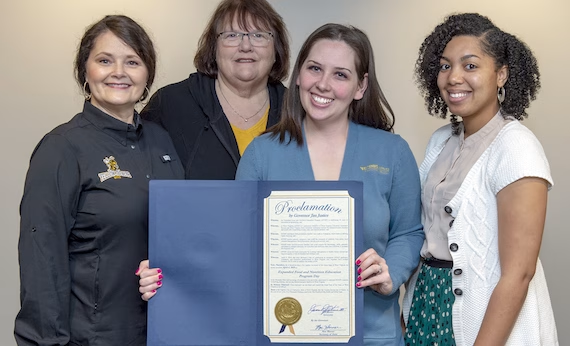Contact: Jack Bailey (304) 766-4109 jbaile19@wvstateu.edu A nationwide community nutrition education program that helps limited-resource families improve nutritional well-being is celebrating 50 years. The USDA Expanded Food and Nutrition Education Program(EFNEP), offered through the Extension Services of West Virginia State University (WVSU) and West Virginia University (WVU), has helped thousands of West Virginians improve their nutrition practices.
To commemorate the 50th anniversary of EFNEP, Governor Jim Justice proclaimed Thursday, April 4, EFNEP Day in West Virginia.
Extension educators bring free information and resources to both youths and adults in several West Virginia counties. Through the combined efforts of WVSU and WVU Extension Services, EFNEP in West Virginia reached more than 8,000 youths, 1,000 adults and 3,500 family members in 30 counties during the 2017-2018 academic year.
The program focuses on limited-resource families with an emphasis on parents and other adult caregivers who have primary responsibilities of feeding young children, as well as specialized programs for moms-to-be and new parents. The program also contains a youth component for ages 5-19.
At WVSU, educators have adapted EFNEP to meet the needs of West Virginians by targeting specific groups, most notably people in recovery.
“EFNEP wasn’t actually designed to reach this population,” said Tammy Hauldren, a WVSU EFNEP extension associate, “but we have such a need in West Virginia that it only seemed fitting to bring this information to the people we serve.”
Hauldren began offering the EFNEP classes at sites such as Recovery Point in Charleston and Huntington to help people in recovery learn the basics of good health and nutrition. Through weekly classes, participants are learning to be more physically active, drink more water and spend wisely at the supermarket.
“Often, our participants know little about grocery shopping and how to spend their money on healthy items in the store, so we cover everything from how to make a list to buying lean protein and making three healthy meals from it,” Hauldren said.
National studies have shown EFNEP participation results in a reduction in government costs spent on health care, increases in fruit and vegetable consumption and physical activity, as well as reductions in food storage and food preparation practices that cause foodborne illness. Participants also learn strategies to stretch their food dollars by comparing prices, planning meals and decreasing food waste. Peer educators cultivate a sense of personal success, which motivates participants to finish high school, pursue a GED or training program, and find employment.
Exit surveys with West Virginia’s adult participants in 2017-2018 showed that 100 percent reported improvement in three or more food resource management practices, such as planning meals, comparing food prices and sticking to a food budget. One hundred percent also improved in five of the nutrition practices, such as making healthy food choices, reading nutrition labels and eating breakfast.
EFNEP is administered by the USDA’s National Institute of Food and Agriculture, in cooperation with the State Cooperative Extension Services via 76 land-grant universities, including WVSU and WVU. The program arose out of societal concern for the millions of Americans who were facing poverty, hunger and food insecurity in the 1960s. Today,EFNEPisactive inall50states,Guam,PuertoRico,the VirginIslands,MicronesiaandAmericanSamoa.
Follow on Facebook, Instagram and Twitter .

University-led Nutrition Program Celebrates 50 Years of Changing Lives
April 1, 2019